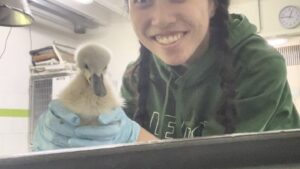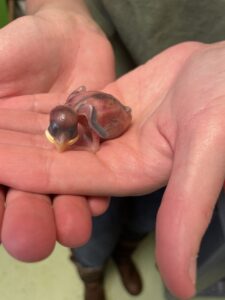A Sanctuary for Birds Becomes a Haven for Learning

The De Wulp Bird Sanctuary in Den Haag, Netherlands, is an oasis for injured and orphaned birds. Established in 1960, the sanctuary rescues an estimated 9,000 members of the avian community every single year. Housing the birds, caring for them, and eventually releasing them back into the wild is no small feat. Cages must be regularly and properly cleaned, meals prepared according to specific schedules and dietary needs, and the nursery tended to during breeding season.
 Few people know this better than Allyson Farnand ’25. A political science major from Rochester, N.Y., Farnand spent a month working at the sanctuary. The experience affirmed her love of birds like the ones she encountered there: there was the Egyptian goose who sadly had two fishing hooks caught in its throat and a line wrapped around its leg that needed careful tending; the magpie who was suffering from a serious infection and who had to be hand-fed using a syringe; and, perhaps most memorably, the woodpecker Farnand helped to care for and whose recovery process she began following on her first day at the sanctuary. She fed the bird and carefully cleaned its cage, and was eventually able to release it back into the wild.
Few people know this better than Allyson Farnand ’25. A political science major from Rochester, N.Y., Farnand spent a month working at the sanctuary. The experience affirmed her love of birds like the ones she encountered there: there was the Egyptian goose who sadly had two fishing hooks caught in its throat and a line wrapped around its leg that needed careful tending; the magpie who was suffering from a serious infection and who had to be hand-fed using a syringe; and, perhaps most memorably, the woodpecker Farnand helped to care for and whose recovery process she began following on her first day at the sanctuary. She fed the bird and carefully cleaned its cage, and was eventually able to release it back into the wild.
In addition to her work at the sanctuary, Farnand loved being part of a Dutch team and working in a supportive environment in which everyone was bonded by their mutual love of wildlife. She noted that the Dutch are “incredibly egalitarian and frown upon hierarchy or the concept of climbing up the corporate ladder.” In particular, she enjoyed working at the sanctuary with staff and volunteers who had been there longer than she had, and learning from them.
In the future, Farnand hopes to study health policy, but she says that she will always have a special place in her heart for ornithology and for birds. This internship allowed her to explore this passion to greater depths than she ever thought she could.
This was truly a one-in-a-lifetime experience and my favorite internship that I have ever completed, and it was the hardest thing to say goodbye to when I headed back to the United States.”
Farnand’s experience at the De Wulp Bird Sanctuary in Den Haag, Netherlands, was made possible by the Ignite Fellowship, which helps students with the costs that are often associated with internships, including food, housing and the inability to work another job.


